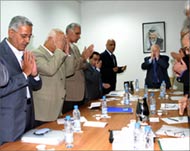Hamas-Abbas split over elections
There is growing disagreement between the acting chairman of the Palestinian Authority, Mahmud Abbas and the Palestinian resistance group, Hamas, over the organisation of legislative elections in the West Bank, East Jerusalem and Gaza Strip.

Hamas has urged Abbas to hold “general elections” – presidential, legislative and municipal – arguing that the present legislative council, whose term of office expired four years ago, is no longer legitimate and must be dissolved immediately.
Hamas’ Gaza leader Mahmud Zahhar on Tuesday said that holding general elections and enabling the Palestinian masses was an essential condition for national unity in the post-Arafat era.
“True national unity begins at the grassroots’ level, we must respect our people’s rights to freely choose their representatives,” said Zahhar.
Reluctance
However, Abbas and his aides don’t seem to favour legislative elections before 9 January, the designated date for the so-called presidential elections.
PA officials cite “logistical and legal reasons”.
“Abbas is not against holding legislative elections, he just believes that it is very difficult to organise such elections in a short span of time,” said Ghassan al-Khatib, the PA minister of labour.
He told Aljazeera.net that preparations for legislative elections were not complete and required some more time to finalise.
 |
|
Arafat’s death has exposed |
“I am convinced the real obstacles are logistical and legal, not political.”
However, Hani al-Masri, a prominent Palestinian writer and political analyst, believes that the real reasons for not holding legislative elections now have mainly to do with “politics inside Fatah.”
Al Masri cited three main reasons for Abbas’s refusal to meet the Islamists’ demands for general elections.
Motives
These include American and Israeli opposition, a desire to maintain Fatah’s monopoly over the national decision-making process, and preserving the internal unity of the movement.
Al-Masri labeled these reasons “unreasonable” and “unconvincing.”
“I think general elections can be organised in three or four months provided there is goodwill and determination.”
Al-Masri argued that in postponing the legislative elections, Abbas and Fatah would be only postponing, not resolving their problems.
Meanwhile, a noted Palestinian academic and political activist has formally announced his candidacy for the upcoming presidential election on 9 January.
New entrant
 |
|
Various Palestinian factions are |
Abdul Sattar Qasim, a Professor of Political Science at the Najah National University in Nablus, said his decision to run for the presidency was made after long deliberations and consultations with nationalist and Islamist forces in the West Bank.
He said, if elected President, he would preserve Palestinian national rights including the right of return for millions of Palestinian refugees expelled from their homes and towns when the Zionist state was created in 1948.
Moreover, Qasim said he would relentlessly fight corruption and establish the rule of law and get rid of those “who have been sucking the blood of our people” – an allusion to corrupt officials.
Qasim was imprisoned for four months in 1999 for signing a petition criticising rampant corruption in the Palestinian Authority.
In 1994, he was shot in the leg and moderately injured by an anonymous Fatah gunman.
The shooting was believed to be connected with Qasim’s outspoken criticisms of the Oslo Accords and Arafat’s domestic policies.